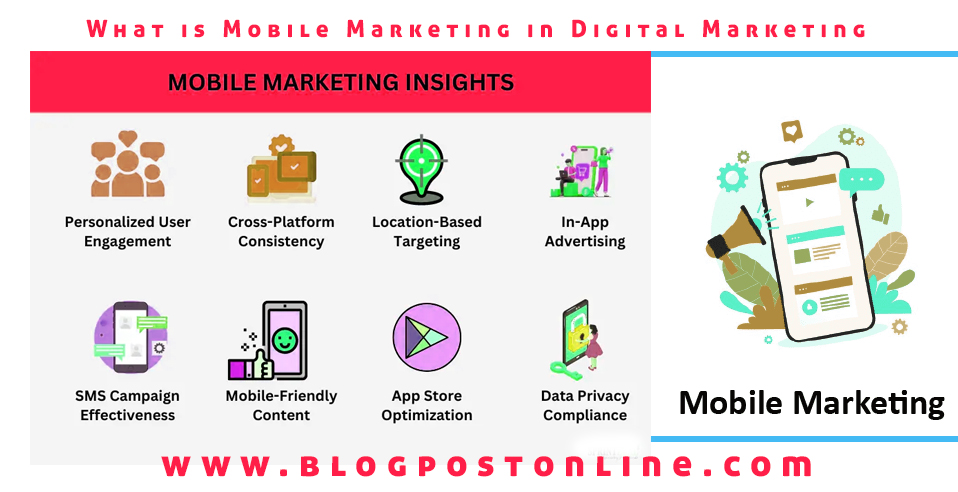Mobile marketing is a sub-discipline of digital marketing that focuses on reaching and engaging with audiences through mobile devices, such as smartphones and tablets.
It involves various strategies, techniques, and channels specifically designed for mobile platforms.
Given the widespread use of mobile devices and the increasing amount of time people spend on them, mobile marketing has become a crucial aspect of a comprehensive digital marketing strategy.

Key components of mobile marketing include:
Mobile Advertising: This involves creating and running ads on mobile apps, websites, and other mobile platforms. Common ad formats include banner ads, interstitial ads, video ads, and native ads. Mobile advertising can be targeted based on user demographics, location, and behavior.
Mobile Apps: Many businesses develop their own mobile apps to engage with customers directly. Mobile apps can provide a more personalized and interactive experience, allowing businesses to send push notifications, offer loyalty rewards, and facilitate e-commerce transactions.
SMS Marketing: Short Message Service (SMS) marketing involves sending text messages to customers with promotional offers, alerts, or other information. It can be an effective way to reach a wide audience quickly.
Mobile SEO (Search Engine Optimization): Optimizing your website for mobile search is crucial, as search engines often prioritize mobile-friendly websites in their rankings. This involves ensuring that your website is responsive, loads quickly on mobile devices, and provides a good user experience.
Location-Based Marketing: Mobile devices have built-in GPS capabilities, which can be used to deliver location-based marketing messages. For example, businesses can send special offers or notifications to users when they are near a physical store or business location.
QR Codes: Quick Response (QR) codes are used to link offline and online marketing efforts. Users can scan QR codes with their mobile devices to access additional information, websites, or promotions.
Mobile Email Marketing: Email marketing campaigns need to be optimized for mobile devices. This includes using responsive email templates, concise content, and attention-grabbing subject lines.
Mobile Social Media Marketing: Social media platforms are heavily accessed on mobile devices. Mobile marketing on platforms like Facebook, Instagram, Twitter, and LinkedIn includes creating mobile-friendly content, running mobile-specific ad campaigns, and engaging with users through mobile apps.
Mobile Payment and Wallets: Mobile wallets and payment options like Apple Pay, Google Pay, and various banking apps are essential for e-commerce businesses. Integration with these payment methods can enhance the mobile shopping experience.
Mobile Analytics and Tracking: Monitoring and analyzing user behavior on mobile devices is crucial for optimizing mobile marketing efforts. This includes tracking app usage, click-through rates, conversion rates, and other key performance indicators.
How to Set Trade Setup in Forex Trading and how to analysis trade in Chart Pattern?
Mobile marketing is continuously evolving as mobile technology advances, and consumer behaviors change. To be successful in mobile marketing, businesses need to adapt to these changes, stay up-to-date with best practices, and tailor their strategies to the preferences and habits of mobile users.